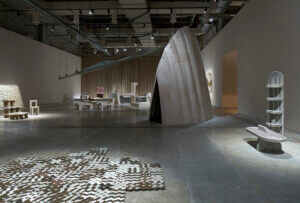Ahead of the 2022 FIFA World Cup, host country Qatar has officially revealed that its seventh stadium for the event will be the world’s first fully modular stadium. The 40,000-seat arena will be constructed mainly from shipping containers and should be fully capable of being disassembled and reconstructed elsewhere.
Announced on Sunday by the Supreme Committee for Delivery & Legacy (SC), the organization responsible for Qatar’s World Cup infrastructure, Ras Abu Aboud Stadium is the latest piece of Qatar’s $200 billion World Cup project to be revealed. The third venue to be designed for the 2022 World Cup by Fenwick Iribarren Architects, the stadium will be located on the waterfront of Doha, the country’s capital. By using modular shipping container blocks containing removable seats, concession stands, bathrooms and merchandise booths, the stadium’s layout can easily be adjusted in the future. Each of the pieces will arrive by tanker and be assembled on site.
SC Secretary General H.E. Hassan Al Thawadi stressed the advantages of modular construction in a statement given to FIFA yesterday.
“This venue offers the perfect legacy, capable of being reassembled in a new location in its entirety or built into numerous small sports and cultural venues. All of this in a stadium that delivers the atmosphere fans expect at a World Cup and which we will build in a more sustainable way than ever before,” he said.
Because fewer materials will be needed in the stadium’s construction, and because Qatar has made integrating the newly-christened Stadium District into the fabric of Doha a top priority, Ras Abu Aboud Stadium will receive a four-star Global Sustainability Assessment System (GSAS) certification upon completion. GSAS is a far-reaching set of rigid green design, build and operations guidelines for cooperating Gulf countries.
Qatar’s involvement with the 2022 World Cup hasn’t been entirely without controversy, however. Despite locking in big-name architects such as Zaha Hadid to either renovate existing stadiums or build modern arenas from the ground up, even FIFA’s own advisory board on human rights has raised questions over how construction workers in the country are being treated. With the country currently facing an embargo from the United Arab Emirates, building materials have also become harder to come by in recent months.
Ras Abu Aboud Stadium is currently under construction and still on track for an early 2020 completion date, a full two years before the World Cup kicks off.










